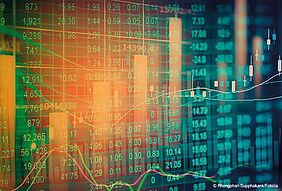After the global economy cooled off in 2019, the economic conditions for the global economy improved again at the end of the year. Two geopolitical conflicts that kept the global economy in suspense eased in December 2019. On the one hand, there are now signs of a regulated BREXIT at the end of January 2020, while on the other hand the signing of a first partial trade agreement between the USA and China in January 2020 has defused the trade dispute between the two countries, which escalated repeatedly in the past year. Continued de-escalation, particularly in this trade dispute, which is to be followed by a second partial trade agreement at the end of 2020 after the US presidential elections, is a necessary prerequisite for improved economic conditions for the global economy. The U.S. presidential election is also likely to be an important topic for the real economy and the capital markets in the new year.
In this environment, we expect the global economy to grow by +3.1% in 2020. The figure remains below its long-term average of +3.5% since 1980, although the economy should gain momentum slightly in the course of 2020. A glance at the global data suggests that the global economy will develop unevenly across regions, with higher emerging market and US growth offsetting weaker data from Europe and Japan. We forecast a slight slowdown in US GDP growth to +1.9% in 2020. This decline is due to the diminishing effects of the 2017 corporate tax reform and the consequences of the trade dispute with China. Domestic consumption, which accounts for around three-quarters of US gross domestic product and has been growing steadily at around 3% p.a. for years, is having a stabilising effect in the USA. In the euro zone we see stabilisation tendencies in the manufacturing industry and a still robust service sector and expect GDP growth of +0.8% as a result. In China, the growth path will continue to gradually slow down to a growth rate of +5.8%. Significant positive growth impulses from China for the global economy are not likely for the time being. Despite 10 years of the current upswing in the global economy and a dip in growth last year, we do not yet expect a recession in 2020, but rather slightly accelerated growth due to stabilizing counter-effects. We expect these effects to occur in particular due to a continued loose monetary policy, although we do not expect central banks to expand significantly in 2020. The ECB is slowly approaching the limits of its possibilities with its bond purchase programme from autumn 2019 and the US Fed has announced a pause in interest rate cuts for the time being. Nevertheless, the central banks remain an important market stabilizer. In addition, we expect the governments in China, the USA, the UK, Japan and Germany to pursue an active fiscal policy by means of tax and spending measures to support growth.
In this late phase of the economic cycle, we expect only slight growth in corporate earnings at the individual company level, after only marginal growth in the global indices last year and even a negative trend in the DAX and emerging markets indices. The price increases on the international stock markets in 2019 are largely based on an expansion of valuation levels. Only slightly disappointing company data could therefore be enough for the market to temporarily switch to consolidation mode in 2020. Nevertheless, the low growth in corporate earnings that we expect to see provides a good basis for moderately rising share prices.
Our forecasts for the US equity, European equity and German equity segments for the end of 2020 are therefore as follows: S&P 500 Index 3,500 points, Euro Stoxx 50 Index 4,000 points and DAX 14,100 points. For the international stock markets, the further course of the US trade dispute with China, BREXIT and the outcome of the US presidential elections are of particular importance in addition to the slight upturn in global economic growth and the internationally supportive monetary and fiscal policy.
Bonds remain a highly valued asset class. Attractive current interest rates can be found outside the euro zone, e.g. in the USA or the emerging markets. In the portfolio context, bonds continue to play an important role as part of diversification and to manage portfolio risk. We expect the 10-year Bund yield to rise only slightly to -0.12% by the end of 2020, as inflation in the eurozone is likely to remain low. For 10-year US Treasuries we also expect only a small increase to 2.00%. This means that one of the main risks for the development of emerging market currencies is low. Within the bond segment we continue to regard emerging market bonds as comparatively attractive, as on the one hand the emerging markets will continue to show significantly higher economic growth than the industrialised countries in 2020 and on the other hand external vulnerability has fallen significantly due to reduced current account deficits in most emerging markets. A disadvantage, however, is the narrowing of spreads in 2019 in this bond segment, which now only provides reduced protection against potentially rising interest rates. The market for corporate bonds is in stable fundamental condition at the turn of 2019/2020. Since a recession is unlikely in 2020, we consider spread products such as investment grade and high yield bonds to be more attractive than government bonds in both Europe and the USA. In our main scenario we expect spreads to remain stable and corporate bond default rates to remain stable and low due to slightly improving corporate earnings growth and continued favourable funding opportunities. For 2020, we expect the USD strength to end and forecast a EUR/USD of 1.14 by the end of the year, especially against the background of a slightly slowing expansionary pace of the US economy. Even a controversial election campaign in the USA could lead to declining capital inflows into the USD and strengthen the Euro.
The influence of geopolitical and macroeconomic risks can repeatedly lead to shocks in the coming quarters, which can trigger high fluctuations on the capital markets. It should be borne in mind that some impending political risks may also have a positive outcome. In such an environment of tension, the asset management portfolio should be able to bring to bear its advantages of active management and the use of different capital market segments.
This document has been prepared with the greatest possible care. For market assessments or benchmark information, the Bank obtains data or information from sources it considers reliable. The Bank cannot guarantee the accuracy, timeliness and completeness of this data or information.
All data serve to fulfil the asset manager's reporting obligations or for information purposes and to support the investor's independent investment decision. This document constitutes neither investment advice nor an offer of investment advice. It does not replace individual investor and investment-oriented advice and does not contain any concrete recommendations for action or investment. This document does not claim to be all-inclusive or to contain all the information that an investor needs for his investment decisions. Historical observations or past performance are not a reliable indicator of future developments.
Only the contractual documents handed over to the client, in particular the terms and conditions of business and sales documents, are legally binding for the content of a contractual relationship between the client and Fondsdepot Bank GmbH.



